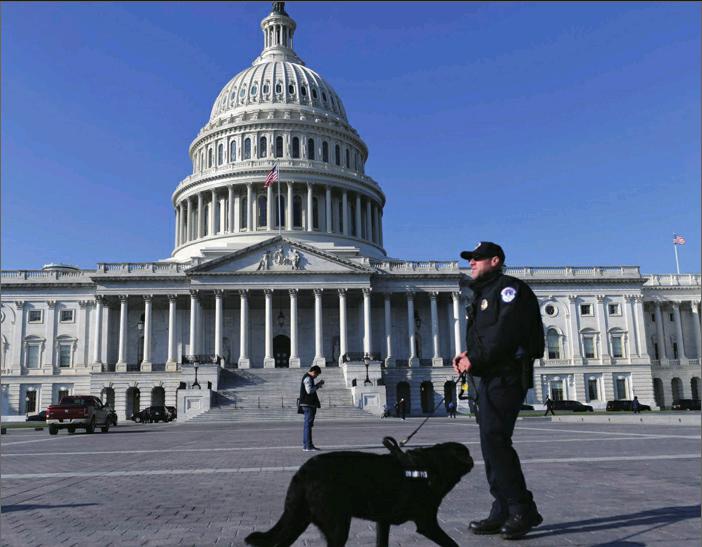Riding Roughshod
By+Clifford+A.+Kiracofe

Congressional Republicans backed by the Trump administration are railroading controversial tax legislation at the years end. Critics say it amounts to class warfare as it benefi ts the rich and corporate America while hurting the working classes.
The legislative process is under fire in part because neither the House of Representatives nor the Senate have held serious hearings to hammer out the complex economic and legal issues involved. Instead the Republican Congressional leadership dumped their legislation on Congress and pushed it through with lightning speed in a matter of weeks.
Since the Republicans control both houses of Congress and also the Executive Branch, the opposition Democratic Party in effect has little say in the matter. But if some Republicans defect from their party line, quick passage of the legislation could be affected, as happened with the controversial health care legislation.
Republicans want to pass the legislation by late December, ready for the president to sign before the end of the year. There are differences between the House and Senate versions of the tax legislation, so they must be worked out in a conference committee composed of members of both parties. The version of the legislation agreed upon then undergoes a fi nal passage through Congress and then moves to the White House.
President Donald Trumps fi rst year in offi ce has been beset with fi erce opposition to both him and his agenda. While there have been a few successes, the record overall is not bright. The health care revision was a debacle, and Republicans have yet to come forward with legislation addressing the in- frastructure shambles in the U.S. and other pressing issues.
The actual contents of the two Congressional tax bills are not altogether clear, and they each run several hundred pages of very fine print. Because of the breakneck speed at which they moved through Congress, members of Congress, not to mention the vast array of Washington lobbyists, are somewhat in the dark and perplexed.
Deepening the divide
There are two broad areas that raise controversy. The fi rst is the impacts on the middle and working classes, and the second is the impact on corporate America. Critics say that the tax legislation represents class warfare. They say that the rich benefit unduly while the middle and working classes get very little relief. This argument has powerful appeal to those who are concerned that the U.S. trend in the past four decades has been that the rich get richer, the poor get poorer, and the middle class gets crushed.endprint
While it is true that both political parties are dominated by Wall Street interests, it is also true that the Democratic Party from Franklin Roosevelts day to the present has been concerned about the working class. Although Republicans claim to represent Main Street, the impression of many is that they are subservient to Wall Street.
So what happens to the middle class under the legislation? According to the Congressional Joint Committee on Taxation watchdog, not much happens. In fact, after several years of proposed marginal relief, the bill actually ends the relief for individuals by 2025, which conveniently for the politicians is just after the 2024 presidential and Congressional election cycle.
Wealthy persons in the half million to 1 million dollar annual income range, in relative proportional terms, are said to come out ahead of the worker at the lower end of the scale in the $30,000 to $40,000 annual income range. Other benefi ts for the very rich include reductions in the estate tax through larger exemptions.
For better or worse?
Overall, according to the committee on taxation, most U.S. citizens will pay about the same amount of tax or slightly less until about 2023. But there will be a sharp shift after 2023, when only 40 percent will pay less. Tax deductions for medical expenses will end in 2018, and most tax benefi ts for college expenses will end. Ending deductions for student loan interest would impact low and middle income citizens.
Meanwhile, corporate America will receive the largest tax cut in its history: from 35 percent annually down to about 20-22 percent. There is also a special provision for U.S. corporations currently holding money abroad to escape U.S. taxation. They will have to pay only 12 percent if they bring it back to the U.S.
Economists critical of Wall Street and corporate America point out that the trend in recent years has been for corporations to spend money buying back their own shares in the stock market. This use of corporate earnings boosts the price of the stocks on the market and thus boosts the wealth of corporate executives who hold stock from their companies in their personal portfolios. Stockbrokers make money facilitating the buying and selling of such stocks.
Economists who are critical of such “financialization” say that this use of corporate money to buy back stock for market manipulation purposes undermines productive capitalism. This is so, they say, because the money should be reinvested for productive purposes in property, plant and equipment, not to mention research and development.endprint
It is an open question as to how corporate America will use this huge tax reduction, which will be made permanent. Will U.S. companies engage in truly productive investments to build capacity and spark innovation? Or will this windfall just be used up in market manipulation through stock buy backs and “fi nancialization?”
International implications
One obvious effect would be repatriation of U.S. funds held abroad in low tax countries or held in the U.S. but on the books of foreign subsidiaries.
Companies manufacturing abroad may arrive at new calculations regarding foreign investment. With a lower tax burden in the U.S., these companies may be able to profi tably shift production back home despite higher U.S. wage rates. The revolution in automation will also impact the calculations and the profitability of onshore rather than offshore production.
Another way of looking at the international implications relates to the matter of just how these tax cuts will be paid for. Cutting taxes means reducing revenue. Thus to be revenue neutral, relevant spending cuts must be made to offset the loss of tax revenue, otherwise the budget deficit increases. The cost of the tax revision is estimated at $1.4 trillion.
When former President Bill Clinton left offi ce, U.S. fi nances looked set to be in good shape. But George W. Bush destroyed that prospect with his unnecessary foreign wars in Afghanistan and Iraq. These alone have cost several trillion dollars. The payment of interest on the war debt had a major budget impact.
Former President Barack Obama together with a hawkish Congress continued bloated and unnecessary Pentagon spending, and the situation is similar under Trump, with more costly global policing activity looming. Given the current imperial mood in Washington, it is not likely that Congress will cut military spending.
As Congress has not proposed spending cuts to offset the tax revision, the budget defi cit may well increase signifi cantly should the revision fail to spark the overall economy sufficiently. Thus the already strained U.S. fi nancial picture will worsen.
While a major tax revision may seem to be a political victory for the Trump administration, it may well be a short-lived one. The 2018 midterm elections are around the corner, and U.S. voters are more fed up than ever with their politicians.endprint

